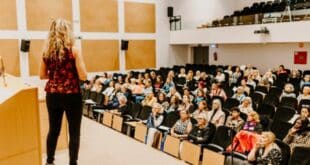Get the Editor’s Digest free
This weekly newsletter features the favourite stories of Roula Khalaf Editor at The Financial Times.
A 20-second clip of a player in flamenco, shirtless, was the beginning. The clip went viral, capturing the heart of a nation and catapulting Manu Moreno, 26 – the personification of Spanish rugby’s new wave – to fame. He has gained a lot of fame. 125,000 followers on Instagram.
If the video pushed Moreno into the spotlight, it also served to amplify the noise around the game. Rugby sevens, an Olympic sport since 2016, features seven players per side and 14-minute matches. It runs on a global tour more akin to tennis or Formula 1 than the domestic rhythms of 15-a-side. Spain’s national football team, also known as Los Leones, have impressed with six semi-final appearances in seven tournaments, but their breakthrough came last December in Dubai: a first-ever final and historic silver, losing only to double Olympic champions Fiji. Along the way, they beat New Zealand twice, the USA and Great Britain – a landmark for Spanish rugby. “We’re not just pretty faces,” jokes Paco Hernández, 36, a former pro who left his engineering job overseas in 2022 to coach Spain’s men’s sevens team. “The next challenge is staying up there, building towards LA 2028,” he continues. “If we improve technically, tactically and structurally then maybe we can dream of medals. There’s still much to do.

Pol Pla, 32, the seasoned captain with a decade on the field and Spain’s all-time top scorer, is equally clear-eyed about the mission. “We want to elevate rugby in our country – a sport still seen as niche – and be recognised for what we do on the pitch, not just for how we look.”
I join the team for lunch at a restaurant by the stadium in Málaga, a few hundred metres from the beach. Salad bowls and a long table are waiting. The waitress calls each player by name as she lists the main-course options, though in the end, we all opt for chicken in tomato sauce with rice. “It’s important that we eat together,” says Hernández, packed shoulder to shoulder with his teammates. “Nutrition is key for these guys and it’s one less thing they have to worry about or pay for.” Then, almost in the same breath, he barks: “Don’t leave your stuff by the door, guys. People are going to trip.” He speaks with the authority of someone much older – almost fatherly – although in Pla’s case, he’s only older by a couple of years. What strikes me about his team, beyond the bustle of 20 athletes, is its respectful order. “Manners,” says the wing man, Moreno, when asked what matters most in a rugby player. “When you join a team you represent the whole group.” You’re out if you don’t respect the rules.

Pla’s decision to move the team to Málaga two seasons ago marked the start of a more disciplined, unified chapter. “Many of these guys were still living at home with their parents,” he says; each player is on a modest salary of less than €2,000 a month. “We’ve built real friendships here,” adds Pla, as he peels a banana. “You must fit in. We spend so much time together that if someone’s not aligned, the group leaves them out.”

Moreno admits that his mind-set has changed since he joined the team in 2020. He is usually more laid-back. “I worry more about messing up,” he says. For him, Málaga meant putting medical school on hold to commit fully to rugby. For Pla, it was a continuation of an already disciplined athletic life – but not without emotional costs. “I want to build a life with my girlfriend,” he says, “but I don’t make enough to ask her to quit her job.” Moreno grins: “But she does make enough for you to move in with her.” Pla laughs. But regular visits to Barcelona to see her are a luxury that he cannot afford. “Footballers hop on planes to New York just to catch an NBA game,” he shrugs. Although the pay does not reflect the hard work, the daily meals, elite training facilities and top-notch physiotherapists all contribute to keeping the team competitive.
The Royal Spanish Rugby Union is struggling to keep up with the sudden rise of Los Leones. Tensions over image rights, sponsorships and funding reveal an institution unprepared for its star team’s demands. As the spotlight shines, it brings with it opportunities but also raises the question: who gets to take credit? Who gets paid? Who gets noticed? Pla has been increasingly vocal in his criticism of the lacklong-term planning, investment and Spanish rugby.

Hernández remains pragmatic about the need for institutional backing. “We wouldn’t be here without them,” he says. Their origin stories – shaped less by federations than by families and coincidences – are a reminder of how far they’ve come. Pla says that rugby is often the result of a family connection. In his case, both of his older sisters were professional players. Moreno’s experience was almost an accident. “My mother saw some children training while she was playing golf in Seville at La Cartuja. She thought they were playing rugby, but it turned out to be American football. They looked like they were having fun and so she took my older brother to rugby. And that was it.”

We head out to the terrace for coffee, where some of their teammates are playing cards. I ask about the key to taking a hit and getting back up. “Training,” snaps Hernández. “I push my players beyond game level so that the field feels easy.” “When you get hit, the mentality is ‘bring it on’,” says Pla. It’s why we train. It’s what we train for. Moreno adds: “All contact sports share the same core – the fight, yes, but above all, respect. Even in the fiercest moments, you know the person in front of you has worked just as hard as you.”
Although they are undoubtedly strong and fit, I have just enough courage after drinking caffeine to say that this team is not the largest in the international sevens circuit. Pla, who is 1.74m tall, says “True.” “But we’re the prettiest.”
 Costa News Spain Breaking News | English News in Spain.
Costa News Spain Breaking News | English News in Spain.







